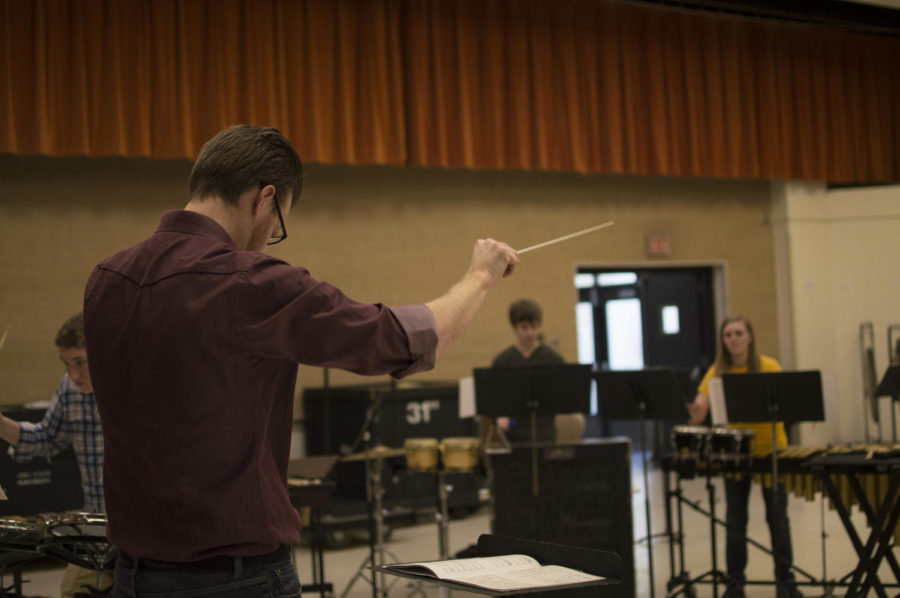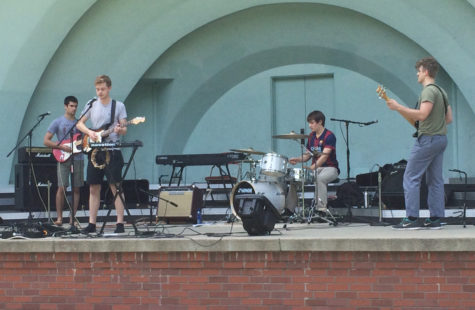Music degree prospects: Pros and cons
Charlie Coffey/Iowa State Daily
Music lecturer Matthew Coley conducts a group of students during a rehearsal on March 13, 2015. Coley performed with Clocks in Motion at the Heartland Marimba Festival’s marimba concert on Monday.
December 10, 2015
Although society is constantly pushing to disprove and eliminate stereotypes, many still live on and influence others’ thoughts and actions. Some are more harmful than others, but the common denominator of stereotypes is the fact that they are not always the truth.
On a college campus of prospective engineers, teachers, lawyers and doctors, the idea arises that students who pursue fine arts degrees such as music can’t find a job. Because of this common thought, many students who enjoy the arts prefer to do so through extracurricular activities.
Michielu Menning, freshman in software engineering, has been making music for more than 12 years. Throughout elementary and high school, Menning took private piano lessons, accompanied local churches and played the trombone in school bands. Yet, when it came to declaring a major, Menning chose to go a different route.
“There are many reasons why I’m pursuing a software engineering degree instead of a music one, the largest one being I didn’t want to make a hobby of mine into a responsibility,” Menning said. “I didn’t want to connect a wonderful hobby and the stress of providing financially together.”
Though Menning no longer studies music as seriously as he once did, he still enjoys playing music in his free time. Since coming to college, he has begun learning how to play the guitar and keeps up with his other instruments.
Menning is not alone in his career decision process. Other students in different majors who enjoy music chose their career paths based on their other passions and security.
“I choose [to participate in] choir because I enjoy singing too much to not be involved in college,” said Lara Hetherton, sophomore in industrial design. “But I chose not to pursue music as a major because I knew design was my passion, and music was my hobby. I didn’t want to struggle for a job once I graduated.”
However, the ISU music department can defend against the music major unemployment theory with a strong placement rate of music education graduates. Multiple faculty members of the music department said music education graduates usually have little trouble finding teaching jobs within the state of Iowa.
“The music education program is our strongest program,” said Kevin Judge, bassoon instructor and academic adviser for the music department. “Just the dedication of our faculty that I’ve seen, we get along so well. It’s more than just a small community here, it’s really a small family.”
Judge said Iowa State’s music department is a good option for students who want a small school feel with the benefits of a large university.
“[Iowa State] is a fun place to go for education because it’s smaller and we all know our professors,” said Erin Quinn, senior in music education. “I think it’s just a really rewarding, fun field and it’s a really unique environment.”
When declaring a music major, students have one of two options. They can go for education and be certified to teach K-12 in choir, band and orchestra, or they can go for a performance emphasis on their specific instrument. Music performance degrees typically lead to graduate school, where students can prepare to teach at the collegiate level or professionally perform.
“It’s very rare [a music performance major] will be able to make a career without the further studying experience,” said Gregory Oakes, assistant professor of music and theatre.
Oakes originally chose to pursue a music performance degree because he wanted to be a professional musician. He received his bachelor’s degree from Michigan State University and went on to study at DePaul University and the University of Colorado, Boulder. Oakes performed with the Colorado Symphony Orchestra until deciding teaching was the best route for him. He has been teaching at Iowa State for seven years and continues to perform solo around the world as his faculty research.
Oakes said students who study music performance have plenty of employment options from teaching private studios, music technology, composing and freelance performing.
“The musical world is becoming a little bit more variegated now, more different possibilities of things,” Oakes said. “People are getting a little more innovative with the kinds of things they’re doing. We’re seeing more people doing performing with small groups, called chamber music. [Performers] are getting a little bit more creative with what they’re doing themselves.”
It is also possible for music majors to find jobs outside the musical world. Other non-musical companies can see music majors as quality potential employees because of their work ethic developed from the demands of their degree.
“A lot of employers [outside the music world] like seeing that you’re a music major because they know how hard you work,” said Taylor Troyer, senior in music performance.
Music degree or not, it can be difficult for all college graduates to obtain jobs in their field. Only 17 percent of the class of 2014 surveyed in the United States had jobs lined up as of May 2014, according to AfterCollege Inc., a site that surveys and works with college students and graduates in finding jobs. However, the attitude for most students in Iowa State’s Department of Music seems to be optimistic for the future.
“There definitely is that worry that you won’t get a job, especially since it’s not just teaching, it’s music,” Quinn said. “You know, fine arts jobs always sound scary, but I think the job market isn’t as bad as people think it is.”
Quinn said music education majors could have an advantage over other education majors because they are certified to teach K-12 opposed to a specific grade level.
Oakes agreed that the job market seems worse than it is, but did not sugarcoat the life of a potential professional musician.
“If [a student is] unsure, I usually kind of discourage them [from pursuing a music major],” Oakes said. “There are a lot of easier ways to make a living out there. I know I’m not going to have great job prospects or a lot of money even if I do succeed, but I’m still going to do it. That’s the thing that a musician is going to come away with. The satisfaction of doing it, that’s what has to be there.”
In the end, students will end up choosing degrees they are passionate about, regardless of job prospects.
“We do it because we love it, and in that sense, a lot of the time you understand that you’re willing to compromise things and a lot of luxuries for the fact that you’re doing what you love,” Troyer said. “You really have to love it and have to not see yourself doing anything else. That’s what keeps you in it.”
As an adviser, Judge said as long as students work hard and make the most out of their college years, their future should be bright.
“You know, you only have one life,” Judge said. “You might as well do what you want. “Do what you like and go for it as hard as you can because something will come out.”















